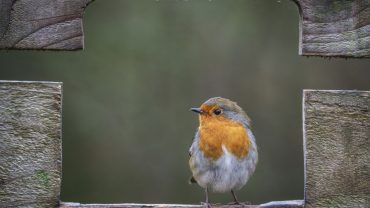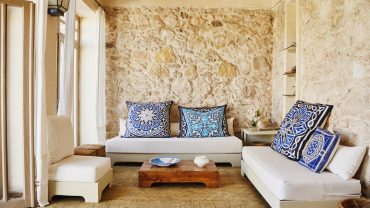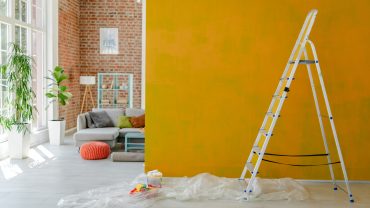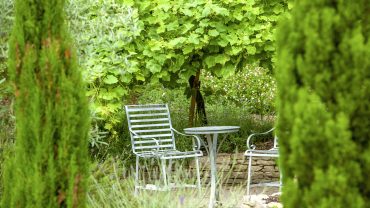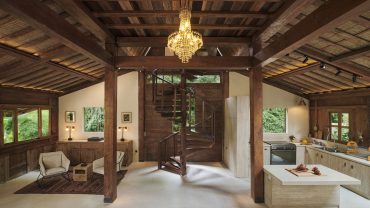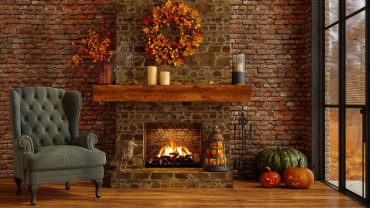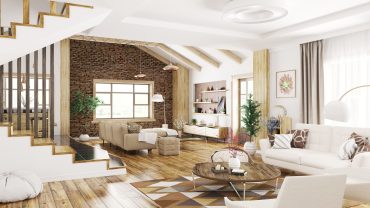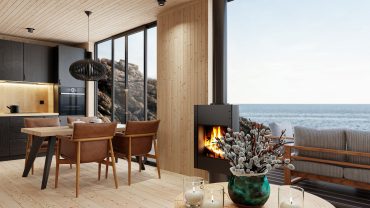In the realm of artistic expression, few styles boast the dramatic flair and intricate detail of Baroque interior design.
Originating in early 17th century Italy, Baroque style rapidly spread across Europe, leaving a lasting impact on architecture, sculpture, painting, and, notably, interior design. But what is Baroque interior design exactly? It’s an aesthetic characterised by opulence, dynamic movement, and a detailed approach to decoration, designed to awe and inspire.
This guide dives into the heart of Baroque’s grandeur, offering insights into its rich history, key features, and how it can be blended into the modern home. Ready to learn more? Let’s get this show on the road.
The Origin of Baroque Interior Design and Architecture

The interior of Nossa da Senhora da Encarnacao is opulently baroque, despite being a much older church. (Credit: Alf via Getty Images)
The seeds of Baroque style were sown in a time of intense cultural and political change. Emerging around the 1600s, the style was initially a tool of the papacy, aiming to convey the power and glory of the Catholic Church through art and architecture that stirred the soul. It was, in its basest form, art as propaganda.
As it evolved, baroque interior design and architecture became a symbol of wealth and authority, seen in the palaces of monarchs and the estates of the aristocracy across Europe. Its spread and development were as much a reflection of the era’s social upheavals as its technological advancements.
The Baroque period was shaped by the hands of masters like Gian Lorenzo Bernini and Francesco Borromini, whose work in architecture and sculpture defined the visual language of the era. Examples of baroque interior design can be seen in the opulent palaces of Versailles in France, the grand estates of England, and the ornate churches of Italy, each space telling a story of power, faith, and artistry. So, how does this translate when it comes to baroque style home decor?
What is Baroque Interior Design?

Luxurious and expensive interior of a large baroque royal living room, featuring antique furniture, gold trim, huge windows, fireplace with gold stucco on the walls. (Credit: 4595886 via Getty Images)
Baroque interior design is a style that reflects the principles and themes of the original movement. Synonymous with extravagance, it thrives on complexity and contrast, layering bold colours, luxurious materials, and an abundance of gold and silver to create a sense of awe. And this is just the tip of the emotional iceberg. The hallmark of the baroque style is pure, unadulterated drama. Delving deeper, its defining features include:
Grand Scale
Everything about the baroque movement is big. Vast, in fact. Designed to convey a sense of majesty and power. Sweeping staircases, soaring ceilings and towering sculptures all form a part of its allure.
Intricate Detail
From frescoes which blur the lines between the architectural and the celestial to stucco embellishments and intricate plasterwork, baroque design is all about complexity.
A Riot of Mediums
The baroque interior style is utterly abundant in its mix of artistic mediums. It brings together sculptures, paintings, architecture, and more, blending it into one overarching whole that conveys a crystal clear message.
Form and Function
In baroque style home decor, furniture pieces are as much works of art as functional items. Crafted from dark, rich woods and often gilded or adorned with intricate carvings, these pieces command attention.
Shapes that Curve
The baroque movement shifted away from corners and edges and towards shapes that were smooth and rounded. In the context of the baroque interior style, that tends to express itself in intricate swirling carvings and ornamentation.
Rich Hues
The colour palette in baroque interior design is deep and resonant. Rich reds, bold blues, and lush greens are accented with gold and silver, creating a backdrop that is both regal and enveloping.
Tempting Textures
Texture plays a crucial role in the baroque interior style, with smooth marble set against plush fabrics and ornate tapestries, creating a tactile as well as visual desirability.
Let There be Lighting
Lighting in a modern baroque interior is designed to dazzle. Crystal chandeliers and candelabras cast a warm, flickering light, highlighting the intricate details of the room and creating a sense of movement. Mirrors play a role in intensifying the sense of light, strategically placed to reflect it and amplify the grandeur of the space.
Evocative Themes and Motifs
Within the opulent framework of baroque interior design lies a profound use of allegory and symbolism, particularly through depictions of people and nature. Paintings and sculptures tell the stories of myth, religion, and royalty that are central to Baroque’s thematic repertoire.
Creating Modern Baroque Interiors

Classic chairs sit amongst a modern baroque interior. (Credit: Tohid Hashemkhani via Getty Images)
One may think that the sheer grandiosity of this bombastic style precludes its inclusion in contemporary homes, but there are plenty of ways to “go for baroque” in any space. For instance:
Select Pieces
Even a single piece can anchor a modern baroque interior, be it an ornate mirror, a luxurious velvet sofa, or a dramatic chandelier.
Attention to Detail
From panelling to mouldings, baroque style home decor can be etched into the very bones of a room.
Layered Luxury
Including luxurious fabrics like velvet and silk, detailed tapestries, and heavy drapes with tassels and fringe can contribute to the overall sense of opulence in a modern baroque interior, while marble floors and surfaces are one way to add a cool counterpoint to the warmth of the textiles.
Mixing Media
Whether it’s intricate tapestries, bronze sculptures, or sumptuous paintings in gilded frames, blending different artforms is a powerful tool in baroque interior design.
Summarising the Baroque Interior Style

A living room, styled in a classic Baroque design. (Credit: Tohid Hashemkhani via Getty Images)
If the world of design is a stage, baroque interior design stops the show in its tracks. And, as we’ve seen, there are plenty of ways to pay homage to this most theatrical of styles in modern baroque interiors.

